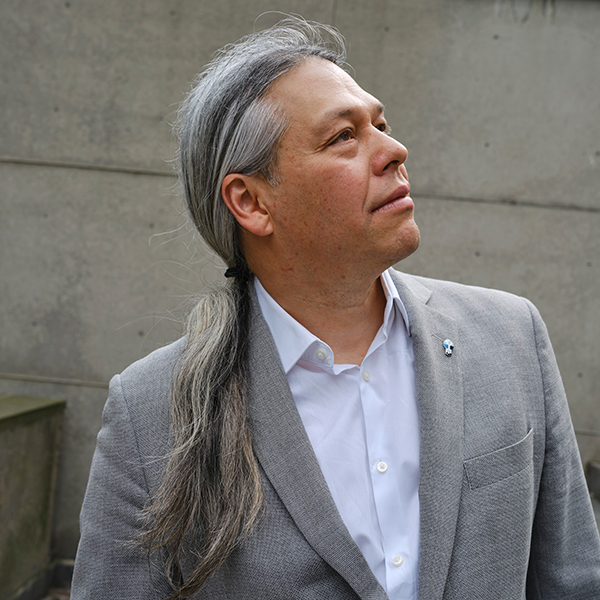“Space… is hard,” says Michael Byers, LLB’92, BCL’92, the Canada Research Chair in Global Politics and International Law at the University of British Columbia.
“The fact that it’s a vacuum, that you need to live in a pressurized capsule with full life support. This is not a human-friendly environment. Space wants to kill us. And when you realize that you see the motivation for cooperation.”
That’s a major part of the reason why, Byers believes, outer space might be the sole realm of human endeavour where – for the most part – people and nations tend to work together. Because they must.
Byers saw firsthand evidence of this at the end of June, when he travelled to Germany to attend a meeting of the United Nations Committee on the Peaceful Uses of Outer Space (COPUOS).
He and UBC astrophysicist Aaron Boley are co-founders of the Outer Space Institute, a network of leading space experts, and Byers applied for observer status so he could witness the UN committee’s proceedings. “If you know how the UN works, most of the real action takes place in the outer corridors.”
He says he was “surprised by how much behind-the-scenes cooperation is occurring between Russia and the United States and China on space matters. Yes, you heard correctly.”
He witnessed an offstage scene involving an agitated Iranian delegate – annoyed that the US was not reining in the presence of Elon Musk’s Starlink satellite dishes in his country, complaining it was “a violation of their sovereignty – which is true,” Byers says.
“I saw the Russian ambassador in a dark corner of the building having a forceful conversation with him.” Iran might have blocked the adoption of the annual (COPUOS) report “and the Russians weren’t going to stand for that.” Iran was “essentially told ‘you’ve had your public gripe, now please just keep quiet.’ And they did.”
So, we can get along for the extraterrestrial good of humanity.
“Space can’t work without cooperation,” Byers says. “The Russian Federation, the United States and China all want the International Space Station to continue working.”
In March, a Russian cosmonaut launched on a SpaceX rocket from Cape Canaveral, and, two weeks later, an American astronaut launched on top of a Soyuz rocket from Kazakhstan. This all happened, Byers points out, “in 2024, during, essentially, a proxy war in Ukraine.” American and Canadian astronauts learn how to speak Russian as an essential part of their training.
International cooperation is evident on other fronts, including the free sharing of satellite imagery after major disasters, and the monitoring of incoming asteroids and solar storms.
That said, there are plenty of issues related to space where the norms of international law might be outdated or fuzzy. That is the focus of Who Owns Outer Space? International Law, Astrophysics, and the Sustainable Development of Space, a recent book that Byers co-wrote with Boley.
“That’s actually one of the big issues: How do we guard against the risks of having actors in space who are not accountable to any Earth government and haven’t signed these [international] treaties.”
Michael Byers, co-author of Who Owns Outer Space?
For instance, space tourism is becoming increasingly popular. What happens if a craft used for tourism encounters problems? Who is responsible for attempting a rescue mission?
There are countries and corporations with a serious interest in mining asteroids – and others on Earth who are firmly opposed to the idea. The growing number of satellites orbiting our planet will eventually lead to a significant increase in potentially dangerous space debris. What does international law have to say about that?
Earlier this year, Who Owns Outer Space? received the Donner Prize for best Canadian book about public policy. “The topic [of the book] is vital, the analysis is thorough, and the finer points of law are meticulously explained,” the prize jury stated.
In 2015, Byers, who had previously looked at how international law and international relations affected other spheres like the Arctic and the world’s oceans, took his eldest son, “a space geek his whole life,” to Cape Canaveral to watch a SpaceX rocket launch.
Eight minutes into the launch firestorm, the first stage of the rocket descended and landed on its four legs – an all-time first. “It’s 19 stories high, that’s like a high-rise building landing on four legs,” says Byers.
“I realized this was changing a form of human transportation, because they can use these [rocket stages] again and again and again,” Byers says. “Just last week, they used one for the 22nd time. Imagine how expensive it would be to fly if you threw away the airplane after one flight. Reusability changes the cost factor by orders of magnitude.”
Intrigued by the impact of such evolving technologies, Byers began reading everything he could find in international law and international relations about space – and discovered there wasn’t as much scholarship on the subject as he expected.
“My skill set could apply here,” he remembers thinking.
At around the same time, a colleague suggested that Byers meet Boley, the astrophysicist, who was increasingly concerned about space debris and the potential militarization of space. Both taught classes on Wednesday afternoons at UBC. They went to an Irish pub and realized that their respective areas of expertise could make for an interesting partnership.
As they collaborated on Who Owns Outer Space, Byers committed to understanding every scientific equation in the book, while Boley focused on building up his knowledge of international law. “I might be able to pass first year physics now,” Byers says.
And to further spread the information, they “spent a pile of research funding” to make the book open-access and downloadable.
One area of concern for Byers with regards to outer space is the increasing influence wielded by a handful of powerful corporate players.
“It’s possible that SpaceX is the Dutch East India Company of the century – that we’ll see a point where private actors get beyond the reach of nation-states. That’s actually one of the big issues: How do we guard against the risks of having actors in space who are not accountable to any Earth government and haven’t signed these [international] treaties, because they can’t. They’re not nation-states.
“Space belongs to all of humanity,” Byers insists. The Outer Space Treaty, signed in 1967 by the US, the United Kingdom and the Russian Federation, and supported by the UN, explicitly states that the Moon and other celestial bodies cannot be owned.
When Apollo 11 landed and Neil Armstrong and Buzz Aldrin planted the American flag, they did not lay claim to the Moon. Similarly, weapons of mass destruction are banned in outer space. “These were wise people who said, ‘We don’t want to make the same mistakes in space that we made on Earth’,” says Byers.
“I think, as a species, we can avoid doing really stupid things,” Byers adds. “I mean, I’m a child of the Cold War, and I’m still here.”


